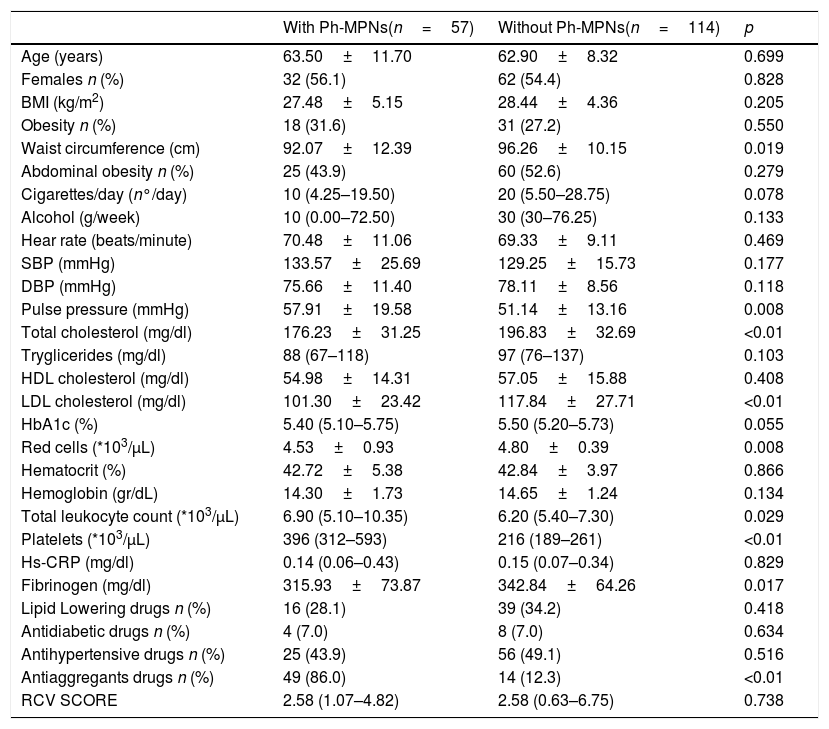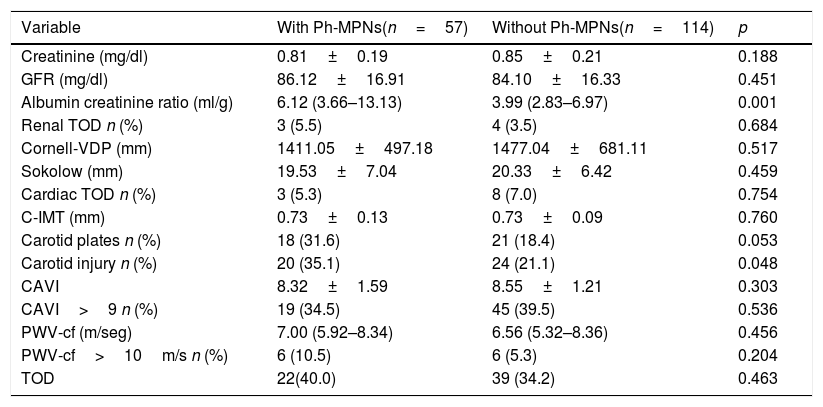To assess whether subjects with Philadelphia negative myeloproliferative neoplasms (Ph-MPNs) show differences in the presence of vascular, cardiac or renal target organ damage (TOD) and other vascular function parameters as compared to individuals without this condition.
MethodsAn observational study was conducted. Fifty-seven subjects diagnosed with Ph-MPNs used as cases and 114 subjects without Ph-MPNs as controls. We matched the subjects with and without Ph-MPNs using the propensity scores in a 1:2 ratio using the variables gender, type 2 diabetes mellitus, high blood pressure, hyperlipidaemia and smoking. Vascular, cardiac and renal TOD were established according to the criteria of the European Society of Hypertension and Cardiology guidelines. Arterial stiffness was also assessed using the cardio-ankle vascular index (CAVI).
ResultsMean age was 63.50±11.70 and 62.90±8.32 years in subjects with and without Ph-MPNs, 32 females (56%) in the first group and 62 (54%) in the second. Subjects with Ph-MPNs have a higher percentage of carotid injury than subjects without Ph-MPNs (35.1% vs. 21.1%) and higher albumin/creatinine ratio. In the logistic regression analysis, subjects with Ph-MPNs had an OR=2.382 (IC95% 1.066–5.323) for carotid injury versus those without haematological disease.
ConclusionsSubjects with Ph-MPNs have twice the risk of by carotid injury than those without haematological disease.
Evaluar si los sujetos con neoplasias mieloproliferativas Filadelfia negativos (NMPs-FN) muestran diferencias en cuanto a presencia de lesión de órgano diana (LOD) vascular, cardiaca o renal y en otros parámetros de función vascular con respecto a los individuos sin esta patología.
MétodosSe realizó un estudio observacional. Se incluyeron 57 sujetos con diagnóstico de NMPs-FN utilizados como casos y 114 sujetos sin NMPs-FN como controles. Emparejamos a los sujetos con y sin NMPs-FN con la técnica de Propensity Score en la proporción 1:2, utilizando las variables sexo, diabetes mellitus tipo2, hipertensión arterial, hiperlipemia y consumo de tabaco. La LOD vascular, cardiaca y renal se estableció siguiendo los criterios de las guías de las sociedades europeas de hipertensión y cardiología. La rigidez arterial también se evaluó con el índice vascular corazón-tobillo (CAVI).
ResultadosLa edad media fue de 63,50±11,70 y 62,90±8,32 años en los sujetos con y sin NMPs, 32 mujeres (56%) en el primer grupo y 62 (54%) en el segundo. Los sujetos con NMPs-FN tienen un mayor porcentaje de lesión carotídea que los sujetos sin NMPs-FN (35,1% frente al 21,1%) y un mayor ratio albúmina/creatinina. En el análisis de regresión logística, los sujetos con NMPs-FN tenían un OR=2,382 (IC95%: 1,066 a 5,323) para la lesión carotídea frente a los que no presentaban enfermedad hematológica.
ConclusionesLos sujetos con NMPs-FN presentan el doble de riesgo de lesión de órgano diana vascular que los sujetos que no presentaban enfermedad hematológica.









